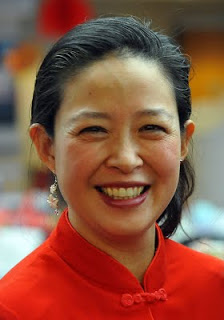( Originally published at 1990 Institute, reprinted with permission of the author.)

______________________________________________________
Women’s History Month started with a bang as Chloe Zhao won the Golden Globe Award for Best Director of a Motion Picture and Best Picture Drama for Nomadland. She is the first Asian woman to win the award, and only the second woman (following Barbara Streisand for Yentl in 1984). Chinese in China and Asian Americans celebrated, although some Chinese pushed back because although Zhao was born in Beijing, she left China at 15 to go to school in the UK and the US, asking if she was Chinese enough.
Adding to this year’s Golden Globe excitement was Minari’s win for Best Foreign Language film, although this categorization was controversial. Asian Americans felt the sting of not being considered American enough because the characters spoke Korean, even though the film was set in America, made by American production companies, directed by an American, starred American actors, and told the classic story of the American Dream.
“Minari is about a family,” said director Lee Isaac Chung while holding his seven-year-old daughter during the award ceremony. “It’s a family trying to learn how to speak a language of its own. It goesdeeper than any American language and any foreign language. It’s a language of the heart, and I’m trying to learn it myself and to pass it on, and I hope we’ll all learn how to speak this language of love to each other, especially this year.”
Learning how to speak a language of family, home, and community is powerful, especially as Asian Americans seek community solutions to recent violence against Asian Americans
After Haijun Si and his family moved into a new neighborhood in Orange County last fall, teenagers and children repeatedly rang the doorbell, pounded on the door, threw rocks, yelled racial slurs, and told them to “go back to your country.” Then neighbors volunteered to help stand watch outside the Sis’ home every night so that the Sis can finally eat dinner in peace and their children can sleep through the night. For Lunar New Year, the entire neighborhood came together as a community to celebrate with
lanterns and lion dancing.
“Communities can take care of one other,” said Lateefah Simon, President of Akonadi Foundation, at the 1990 Institute webinar, Beyond Headlines: Protecting Asian Americans during Violent Times, last week. “I am so inspired by our folks reclaiming the narrative. That our folks are not pitted against each other. Yes there is deep violence, there is deep hurt, there is deep pain. But that must not be the end. When communities come together, as they have in Oakland and across the country, we continue our lineage of a human and civil rights movement in this country.”
“What has really encouraged me is to see the Asian American community flock together, said Russell M. Jeung, San Francisco State University Professor of Asian American Studies, Stop AAPI hate Co-Founder, and the 1990 Institute Advisory Council member at the 1990 Institute webinar. “They are standing up at whatever organization they belong to – whether it’s a church or a school place, they are taking leadership in saying, ‘This is wrong,’ and they are getting their local institutions to pass resolutions to say
anti-Asian racism is not condoned.
___________________________________________________
Billy’s Comments: I am a Chinese American. I am a big fan of Frances and truly admire her Community Spirit and her scholarship. I truely believe that however difficult it is, we must focus on building Global Family, Global Community, Global Friendship, and United Global Language as our ultimate goal together.